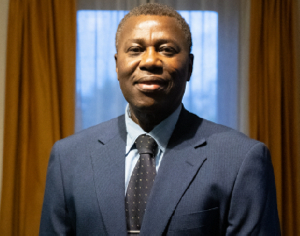Concerns over the lack of respect for norms and standards relating to academic work by higher education institutions in the country have been expressed by the Minister of Education.
Professor Naana Jane Opoku Agyeman said the Ministry was working closely with the National Accreditation Board (NAB) and National Council for Tertiary Education (NCTE) to ensure images of elite institutions were not damaged since qualification from universities in Ghana were respected for their quality.
The statement was read on her behalf at the 47th Congregation of the University of Cape Coast, during which 6,029 students were awarded degrees from the Centre for Continuing Education (CCE) during the 2012/13
The programmes include diplomas in basic education, psychology and foundation of education, management studies, commerce and bachelors in psychology and foundation of education, commerce, management studies and marketing.
Prof. Opoku-Agyeman said she was pleased to note UCC was not only concerned about the same issue but had actually taken steps in the recent past to protect its image in all its institutions.
She commended the University for providing alternative means of increasing access to university education through distance learning mode and for the judicious use of its internally generated income which she said was used to finance and implement the intended expansion and changes.
She lauded plans by the University to expand the distance learning programme by upgrading the CCE to a college status to enable it take responsibility, offer its own planning and raise distance education delivery to a higher level.
The Minster said the expansion would improve the mode of delivery to include teleconferencing, radio broadcast, eLearning and that improved internet facilities would enable live lectures to stream from the university to all study centres to enable students receive instructions directly from the college.
Prof. Mahama Duweija, Executive Secretary of NCTE, applauded members of UTAG for their approach towards issues regarding the Book and Research Allowance and assured them of the council’s efforts in ensuring that their concerns were addressed.
Claims that students of distance education were inferior to the regular students were dispelled, adding that the distance education had given opportunity to many workers who by the demand of their jobs or distance could not have furthered their education.
The Vice-Chancellor, Prof. Domwini D. Kuupole, said an E-learning platform for the delivery of undergraduate and postgraduate course was due for completion by the end of 2014.
He added that UCC, in collaboration with the Distance Education Students Association of Ghana (DESAG), was planning to procure tablet computers for all distance education students on credit to assist students to launch a new era of learning with ICT as well as facilitate academic work.
Prof. Kuupole said the plan, expected to be executed by the commencement of the next academic year, would coincide with the commissioning of the e-Learning platform and that there were plans to review and digitize learning modules so that distance education students would no longer be required to travel around study centres with large volumes of modules but just a small iPad.
He said the university was in the process of integrating data on distance students onto the main university database and by this feat, it was expected students on distance learning will soon access academic materials electronically.
Starting from the 2014/2015 academic year, Prof. Kuupole said the university will open 12 new study centres at Axim, Enchi, Kasoa, Nandom, Lawra, Asankragwa, Bimbilla, Bawku, Dodowa, Navrongo and Akosombo to make access to learning centres readily close to teachers and public sector workers who wish to further their studies but still stay close to their places of work.
Regional News of Monday, 2 June 2014
Source: GNA












